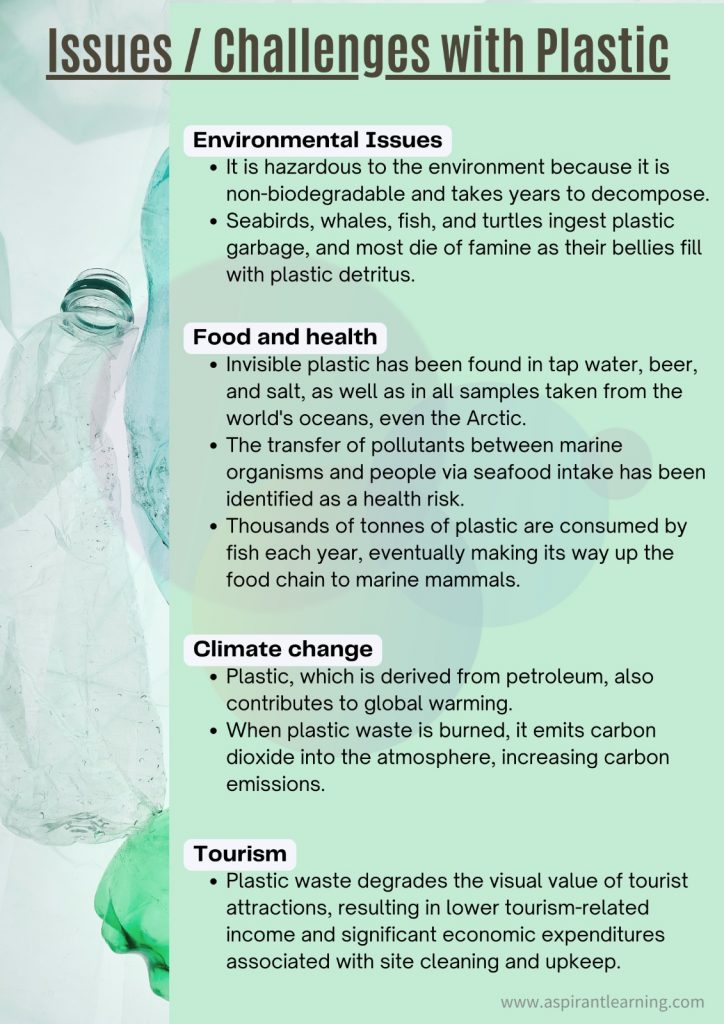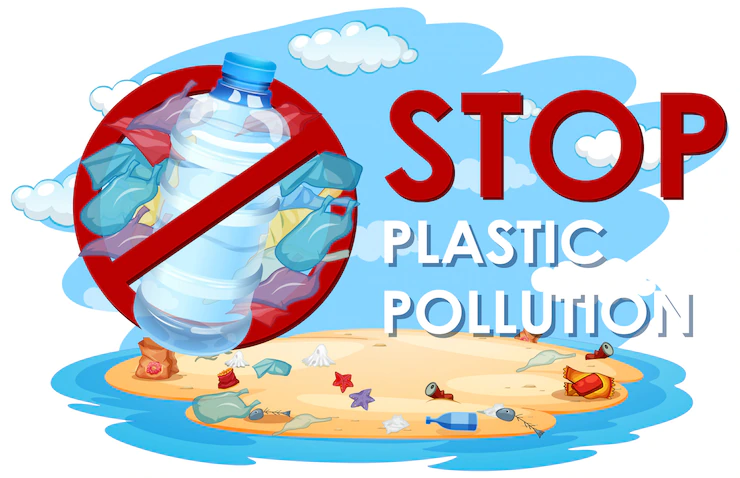News Highlight
Without new policies, plastic consumption across G20 countries to double by 2050: Report.
Key Takeaway
- Plastic consumption across G20 countries is expected to double by 2050, according to a new report nearly.
- According to the paper Peak Plastics: Bending the Consumption Curve, published on February 26, 2023, the volume of plastic consumed throughout the G20 countries.
- It would increase to 451 million tonnes by 2050 from 261 million in 2019.
Peak Plastics: Bending the Consumption Curve
- About
- The report is the first to forensically assess the possible impact of proposals under consideration by UN plastic treaty negotiators.
- If negotiations fail, yearly G20 plastic manufacturing might reach 451 million tonnes by 2050.
- It investigated the possible impact of three important policies that cover the whole plastic lifecycle, from production to disposal.
- The examination focuses on the G20’s 19 member countries.
- Report Highlights
- All three policy levers fail to prevent an unstoppable increase in plastic usage.
- They include;
- A prohibition on problematic single-use plastic.
- A polluter-pays an extended producer responsibility plan for full end-of-life costs.
- A tax on virgin plastic manufacture.
- Only bolder measures, such as prospective curbs on virgin plastic manufacture, will result in peak plastic and future usage slowing.
- Peak plastic consumption: The volume and point at which global plastic usage ceases to grow and begins to decline.
Plastic Consumption across Globe
- Overview
- According to a Back to Blue project assessment, plastic consumption in G20 countries might nearly double by 2050.
- Unless new worldwide policies to minimise its use are implemented.
- Plastic usage is expected to rise the most in countries with the fastest economic and population growth in the coming decades.
- By 2050, plastic use is anticipated to nearly double to 451 million tonnes, up from 261 million tonnes in 2019.
- In addition, the most effective solution is a ban on single-use plastics.
- But even with the ban, plastic usage in G20 countries will be 1.48 times higher in 2050 than in 2019.
- Extended producer responsibility programmes will not affect single-use plastic product use.
- The Plastic Waste Management Rules, 2016 now prohibit manufacturing, importing, stocking, distributing, selling, and using carry bags and plastic sheets thinner than 50 microns nationwide.
- According to a Back to Blue project assessment, plastic consumption in G20 countries might nearly double by 2050.
Challenges in controlling plastic pollution
- Weak enforcement of regulations
- While India has passed legislation to combat plastic pollution, enforcement has been lax.
- It is due to limited resources and insufficient monitoring and reporting methods.
- Lack of public awareness
- More widespread public education programmes are required to promote plastic alternatives and effective trash disposal techniques.
- Limited infrastructure
- Many landfill sites are poorly managed and overflowing due to ineffective garbage collection and segregation mechanisms.
- Recycling challenges
- While India has a thriving informal recycling business, there are issues with recycled plastic quality and safety.
- As well as a lack of standardised recycling techniques and technology.
- Single-use plastic production
- India continues to manufacture many single-use plastic goods, such as straws, cutlery, and bags, which are difficult to recycle and frequently wind up in landfills or waterways.
Steps taken by India to control plastic pollution
- Ban on single-use plastics
- Many states in India have outlawed the production, use, and sale of single-use plastics such as bags, cups, plates, cutlery, and straws.
- Extended Producer Responsibility (EPR)
- The Indian government has enacted EPR, requiring plastic manufacturers to manage and dispose of trash their goods generate.
- Plastic Waste Management Rules
- In 2016, India enacted the Plastic Waste Management Regulations.
- It establishes a framework for controlling plastic waste through various means, such as recycling and waste-to-energy projects.
- Swachh Bharat Abhiyan
- The Indian government began the Swachh Bharat Abhiyan, a countrywide cleanliness initiative that involves plastic garbage collection and disposal.
- Plastic Parks
- Plastic Parks, specialised industrial zones for recycling and processing plastic waste, have been established in India.

Way Forward
- The G20 Plastic Pollution Report is a wake-up call to politicians, industries, and citizens to take meaningful steps to reduce plastic usage and pollution.
- According to the study, if no significant policy changes are made, plastic consumption in G20 countries might quadruple by 2050.
- It results in serious environmental and health implications.
- It is heartening to see several G20 countries take initiatives to reduce single-use plastics.
- But bolder and more ambitious policies are needed to achieve major reductions in plastic pollution.
Pic Courtesy: freepik
Content Source: Down to Earth



